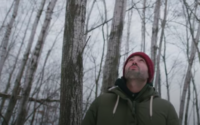Colter Wall’s Cover of “Evangelina”
For me, it’s the way it starts. No, I don’t mean the sentimental sashay of an intro, with acoustic guitar and harmonica refracting like heat waves on the horizon line. I mean the moment when Colter Wall‘s voice charges onto the scene. It’s in the way he delivers the opening lyric, accentuating the moment right before he descends from major to minor chord like one glorious leap. “And I dream in the morning,” Wall sings, his husky baritone building a reverie, “that she brings me water.” The whole thing feels like the most delicious vocal uppercut, an attention grabber that might typically fall closer to the bridge or chorus, but here clarifies the stakes from the jump.
The song, originally written by American folk artist Hoyt Axton in the 1970s, appears on Wall’s latest album Little Songs. Unlike the original, which followed a punchier sheen, Wall finds something languorous to explore. Much like the Texas-Mexico border he sings about, his emotions wander more fraught territory than Axton dared. “Evangelina” details the narrator’s love for the eponymous woman—a “poor man’s daughter/ from Puerta Pinasco”—who remains out of reach, and Wall’s voice signals the impossibility of that distance.
The nearly 50-year-old song sounds as though Wall was always meant to cover it. His voice, a delicious blackcurrant barrel-aged whiskey, has drawn countless comparisons to Johnny Cash thanks to the similarity of their timbres. But while Cash tended to sing with a swagger that could sound aloof, Wall’s voice exudes a warmth that gets me every time. (Then again, I am a sucker for the lower registers.) It’s a campfire voice—all heat and light and smoke.
Wall puts it to good use on “Evangelina,” a track that signals an interesting departure for the Canadian singer-songwriter. Across two previous albums—2018’s Songs of the Plains and 2020’s Western Swing & Waltzes—he’s played with innumerable country subgenres, including honky-tonk, western swing, and even the Bakersfield tradition. But “Evangelina” touches on the Mexican and Mexican-American roots of traditional country. Wall interpretation nods more specifically to that history.
The harmonica lays down a rhythmic track reminiscent of a slow-moving train, while pedal steel winds about the scene like the most delicately trimmed Spanish lace. Those airier touches, paired with Wall’s deep register, create a dreamscape so vivid, so captivating, that it registers more like a movie. Again and again, I find myself returning to bask in the glow.



